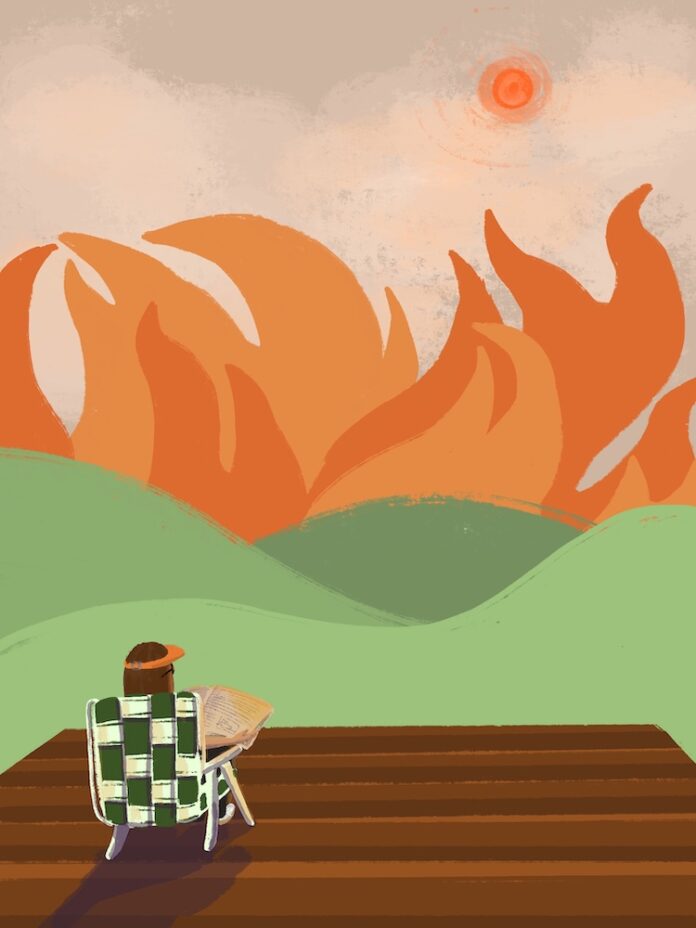The week of July 4th, 2021, I woke up to hazy skies. I walked out of my room and noticed the dim, straining sunlight making its way through the windows. I stepped out onto our back porch and looked up at the haze that had settled against the Chicago skyline. That evening, I walked my dog through our neighborhood and watched the red sun sink below the buildings. Meanwhile, wildfires raged in Canada and along the Western United States.
This wasn’t a new sight for me, although I wouldn’t exactly call it familiar either. My neighborhood looked like this once before, in September 2020 when the California wildfires were at their peak. I remember stepping out in between my online classes in hopes of doing some homework in the sun only to notice that it was just barely making its way through a blanket of white haze. Confused and a bit alarmed, I did a quick Google search and was met immediately with an array of articles explaining that this white haze was the result of smoke from the California wildfires being blown across the country and settling in the Midwest.
So when I stepped outside on that morning in July 2021 and noticed that same white haze had made its way back to Chicago, I checked the news to see if anyone else had noticed this unsettling occurrence had happened again. Unlike in 2020, I couldn’t find a single article about the effect the smoke was having on Chicago’s skies. The haze remained for about a week, and during that time I continued to check the news to see if any paper in the Chicagoland area had covered it — but none of them did.
This lack of media coverage was alarming.
I felt as though I could walk outside my house and literally point to the effects that climate change was having on the earth for just the second time in my life. I have only ever lived in the Midwest. I have never experienced fire season on the West Coast or flood season on the East. For the past 20 years of my life, I couldn’t point to tangible examples of climate change simply because of my geographic location within the U.S. But now, fire season has become so bad that all I have to do is step out onto my back porch and look up at the sky. That change happened in my lifetime, and that feels like something worth covering to me.
The lack of media coverage also made me feel like everyone was accepting these changes in our environment as the new normal. Our skies were literally changing color — nothing about it felt normal to me. I woke up every day hyperaware of the changes I was seeing in the sky and the sun, and I felt like I was the only one who was noticing them. I was expecting outrage at the most, concern at the very, very least. Instead, I was met with silence.
There is undoubtedly a strong correlation between climate change and increasingly more untamed wildfires. From 1970 to 2016, the average wildfire season has increased by 105 days. In 2020, California set new records for the largest fires ever seen across the state and the most acres burned. While I do believe that reporting on the wildfires themselves is completely necessary, it is not enough. We must also discuss the widespread repercussions seen across the country during wildfire season.
To say that climate change is overwhelming is perhaps the biggest understatement of our generation. It’s terrifying, disheartening and all-consuming at times; and especially on an individual level, it can feel like nothing you ever do will be enough to help. But one thing we can do right now is hold the media accountable and hold ourselves accountable to make sure we do not get desensitized to the effects that climate change continues to have on the Earth.
I am not suggesting that we all break out in a full-blown panic. I know from personal experience that climate anxiety can turn very quickly into climate despair or burnout. It’s easy to jump between avoiding all climate-related news or doom scrolling for hours, neither of which do anything to quell my anxiety. It is always important to prioritize our mental health — I try to find a balance by keeping up to date on climate-related news but limiting my intake to only 15 minutes a day. I have also found that while individual actions, such as avoiding single-use plastics or composting are not the solution to the problem, they can make me feel a little more proactive.
I am suggesting that we resist becoming desensitized to ongoing environmental changes and disasters, and stay clear-sighted amid increasingly hazy skies. While we must always prioritize our mental health, it is still important to pay attention to the world around us and ask our media outlets to cover climate disasters with vigilance — no matter how common they become.
![]()































